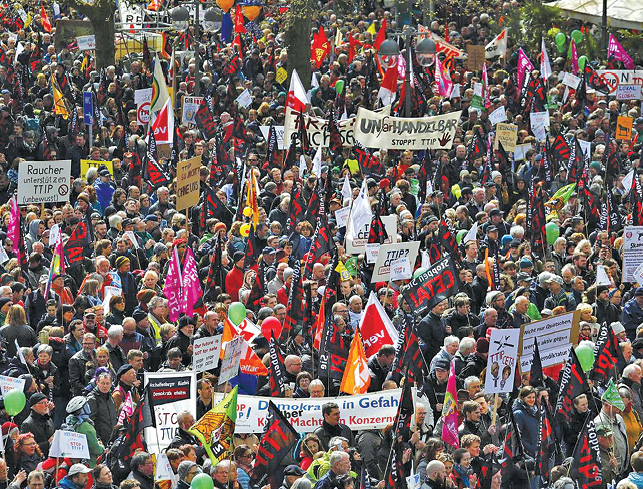July 8, 2016
Thousands Protest Secret Trade Deals
Secret trade Deals Could Lead to Postal Privatization

(This article first appeared in the July-August issue of The American Postal Worker Magazine)
Approximately 30,000 protestors took to the streets of Hannover, Germany, in late April to protest secret trade deals that are being negotiated behind closed doors between the U.S., the European Union (EU) and 21 other countries.
President Obama was in the country to discuss the pacts with German Chancellor Angela Merkel, and demonstrators used the visit as an opportunity to shed light on the shady deals. One such deal is the Trade in Services Agreement (TISA), which could pave the way for privatization of the U.S. Postal Services.
Little is known about TISA because talks have been taking place in secret since 2012; the public has had to rely on leaked documents for insight into its provisions.
Based on the little information available, there is reason for serious concern.
An assessment by the International Transport Workers’ Federation (ITF) published in 2014, concluded that the trade deal is designed to rip apart the relationship the U.S. Postal Service has with customers and postal unions.
TISA regulations would trump the laws of participating nations, and member nations could challenge requirements in other countries to serve customers in all areas, jeopardizing service to rural communities.
The lobbying group Express Association of America, which represents FedEx and UPS, states that TISA “provides an opportunity to review the postal policies of the negotiating partners.”
According to the lobbying association, TISA is expected to eliminate regulations that favor public postal services and ban government entities from reversing privatization.
“International profiteers should have no say in our national treasure, the public U.S. Postal Service,” said APWU President Mark Dimondstein. “TISA is another glaring example of why we must stand together to fight back against these secret trades deals.”
French Workers Protest Labor Reform
Transportation workers across France began shutting the country down with roving strikes in May to protest a labor “reform” bill that would rob workers of basic rights.
Throughout May and June, workers shut down rail and metro transportation, and put blockades at oil refineries, docks and nuclear power plants.
Under current French law, workers in both the public and private sectors enjoy certain basic rights, including a 35-hour work week, job security and overtime premiums.
These rights would no longer be guaranteed under the bill proposed by President Francois Hollande. Employers would instead negotiate these issues, with unions or with individual workers in worksites that are non-union. Employers also would be permitted to request more hours of work at a reduced overtime pay, and would be allowed to lay off employees at will.
“Workers and student allies are reacting to the proposed reforms with a militant energy that has revitalized labor,” Labor Notes reported. Although only eight percent of French workers belong to unions and the strikes have been disrupting commutes, polls repeatedly showed public support between 50 and 70 percent.
“Did Mr. Hollande in his program as presidential candidate say that he would attack the labor rules? If I remember well, he said he would attack finance,” Phillipe Martinez, president of the French trade union CGT, said. “The people who are angry at him today are those who voted for him in 2012,” the Financial Times reported.



